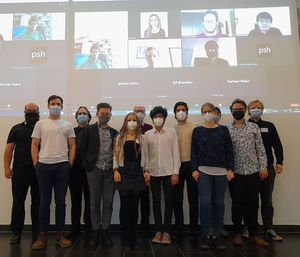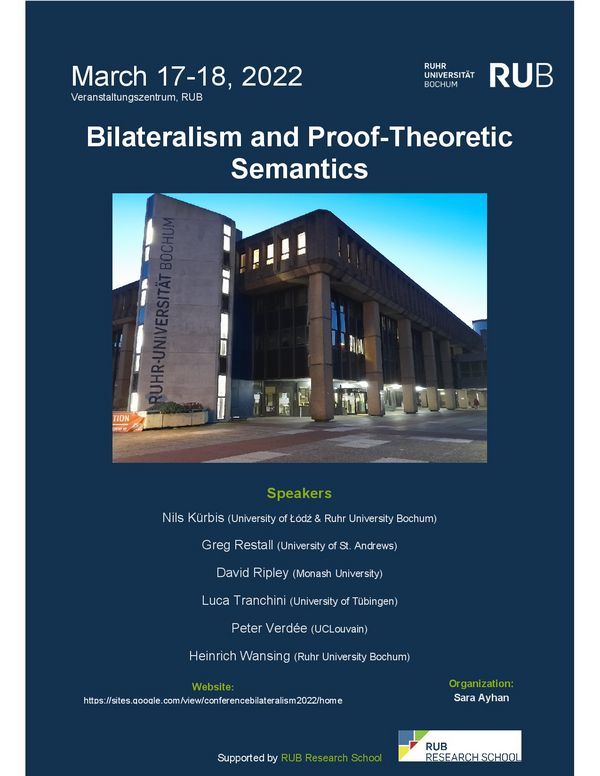- You are here:
- Startseite
- Doctoral Researchers
- Funding for Internationalization
- Project International Event
- Funded International Events
- Bilateralism and Proof-Theoretic Semantics
Bilateralism and Proof-Theoretic Semantics
17-18 March 2022
The topic of bilateralism - situated in the area of proof-theoretic semantics - has received considerable attention in the area of philosophical logic within the past years. According to proof-theoretic semantics the meaning of the logical connectives is determined by the rules of inference governing their use in proofs. In this context bilateralism demands an equal consideration of dual concepts like truth and falsity, assertion and denial, or proof and refutation in that they should both be taken as primitive concepts, i.e. not reducible to each other.
The 2-day conference was organized by Sara Ayhan, PhD student in the Department of Logic at the Institute of Philosophy at RUB, with generous funding and help of the RUB Research School. It aimed at sharing and discussing the latest research in this area by bringing together both highly distinguished as well as early career researchers. It was held in hybrid format, where most of the speakers attended in person, while the online format allowed a bigger audience to participate. On site in Bochum 16 persons attended, next to the speakers there were also several researchers from the local logic group. The online audience consisted of around 30 participants ranging from Europe, the US, Japan, and Australia, so it can be said that the conference received considerable international attention. From the feedback of the speakers and both the online and on-site participants it can be concluded that the conference was a great success. Especially for the on-site participants there were plenty of chances to network and discuss informally during the coffee and lunch breaks and over the conference dinner.
The invited speakers:
Nils Kürbis (University of Łódź & Ruhr University Bochum) presented a specific problem which assumptions pose for bilateralism, in that this would allow to iterate speech acts. His suggested way out of the problem is to move to a different framework for bilateral logic, one in which there are two kinds of consequence relation, proof and refutation.
Greg Restall (University of St. Andrews) presented a new natural deduction calculus “with alternatives”, meaning formulas in consequent, or positive position, other than the conclusion of the proof, in addition to assumptions (formulas in antecedent, or negative position). By this he showed how such a framework can give us a new angle from which to view the impact of the structural rules and differences between certain connectives.
Luca Tranchini (University of Tübingen) presented two proof systems for bi-intuitionistic logic, a proof-net-like natural deduction system, and a cut-free sequent calculus in which sequents are enriched by a dependency relation between formulas in the antecedent and in the succedent.
Peter Verdée (UCLouvain) presented what he called constitutional logic, which is a generic bilateral framework for semantics and proof theory in which the meaning of sentences and inferences is wholly determined by a constitution: a well-founded structure of constitutive sequents, i.e. metasequents that express that a set of inferential statements has the potential to directly ground another inferential statement.
Heinrich Wansing (Ruhr University Bochum) presented joint work with the organizer, Sara Ayhan, in which they discuss the concept of logical bilateralism and suggest a notion of bilateralism that diverges from several other conceptions. The idea is to conceive of logical bilateralism not as a theory of speech acts, as is usually done, but instead as a theory of two primitive derivability relations.
Next to the invited speakers, the PhD students Sara Ayhan (Ruhr University Bochum), Leonardo Ceragioli (University of Pisa), Pedro del Valle-Inclan (Scuola Normale Superiore Pisa), Alexander Gheorghiu (University College London), Mena Leemhuis (University of Lübeck), and Matteo Tesi (Scuola Normale Superiore Pisa) got the opportunity to present their work in this area and get valuable feedback from the senior researchers and their peers.
This workshop was oranized by Sara Ayhan. If you have any questions about the workshop, she will be happy to hear from you via e-mail.
- Research related competencies: Workshops & Events
- Career Preparation: Workshops & Events
- Research Management Skills: Workshops & Events
- Full list of workshops & events
- Funding for Internationalization
- Advising & Ombudsperson
- Doctoral Database
- Welcome Hour
- Newsletter
More information about the conference
If you want to learn more about the conference, please read the program of the event.




